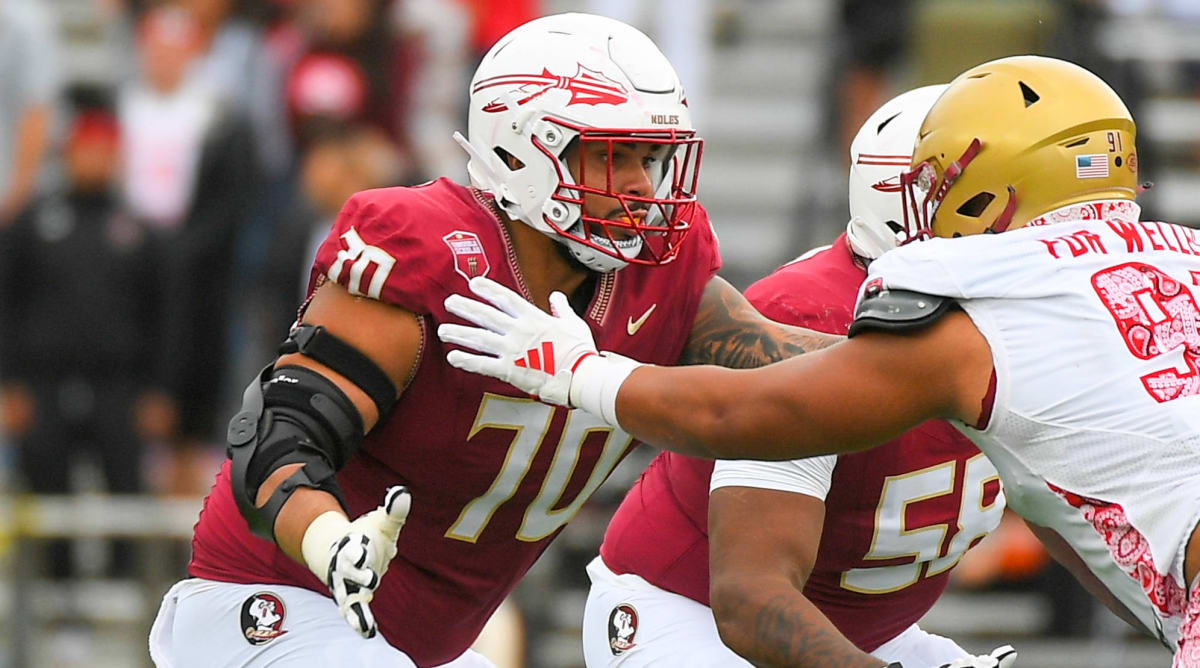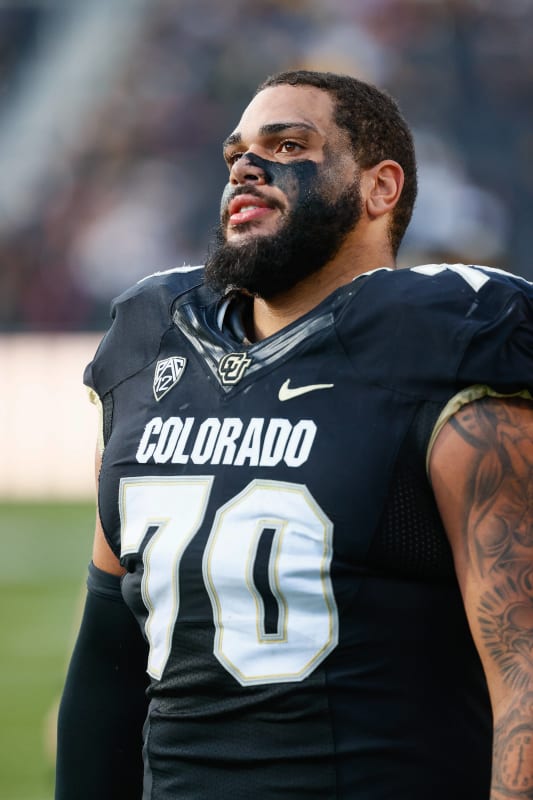The lineman hops on a Zoom call one day after the college football team he plays for made national news—and not for its undefeated season. Well, sort of for that, because the Florida State Seminoles did win each of their 13 games, did impress with their star quarterback and after losing him to injury. The Seminoles, in fact, did everything they could to make the College Football Playoff—only to be left out anyway.
That’s not the reason Casey Roddick, the versatile offensive linemen in question, is on the video call. But it still seems like the only appropriate place to start the conversation.

Erica Denhoff/IMAGO
His answer says more about him than the actual words he chooses do. His teammates couldn’t control the committee’s thought process, and he says they understand that. They did partake in some dwelling, but only for a few hours. And they’re refocused on what he calls their mission, which might be more difficult than either playoff matchup: a date with Georgia, the defending national champions and No. 1 team through most of this season, in the Orange Bowl.
Roddick, to the lack of surprise from anyone who knows him, helped shape this collective response, despite this being his only season with the Seminoles. He reminded teammates of all they invested, of what they wanted back in January, when another season started shortly after last season ended with a 10–3 mark for a program on the upswing. Roddick, he reminded them, hadn’t even arrived yet. No one expected to go unbeaten. Most would have donated at least one finger for a bowl game of this magnitude. “We’ve got a lot of goals,” he told teammates. “And we’ve gotta check them all.”
“It’s not a sense of being vulnerable,” he says. “It’s a sense of understanding. Why not get more fired up? There’s still stuff to do. There’s still work remaining. That’s the mentality; never satisfied.”
As he talks, it becomes immediately clear that Casey Roddick is no ordinary human. His LinkedIn page is proof, starting with the fact he has one. It leads with, “Experienced professional with a diverse background encompassing leadership, analytical acumen, and a strong foundation in psychology and interdisciplinary social sciences.” It describes one stint as an intern analyst for a real estate company. And another as a courier for a billing/coding medical company. And his time at Colorado, before Coach Prime came in and nudged all captains, like Roddick, toward other programs. And his degree in psychology. And his other degree, in interdisciplinary social sciences. And his NFL prospects, which continue to elevate, especially in conversations like this.
He's asked if this bearing came from parents, a mentor, a coach. Instead, he says he was this way from birth: detailed, thorough, even, analytical; ambitions aimed up at the moon. He wasn’t dying to transfer, immerse in a new program, learn a new offense and play for a new team. But what an opportunity. He thought FSU earned a slot in the four-team playoff. But what a season, either way, especially in regard to what they could control—and did.
Still, the purpose of the call is not revealed on his LinkedIn profile. It hasn’t been made public much at all, period. It started long before the global pandemic threw his life into uncertainty and continues, all the way to now.
Roddick believes the turns his life took helped him, made him stronger, through obstacles surmounted alone. The biggest happened in January 2021 after a positive test for COVID-19 netted an unexpected—and terrible—diagnosis. Roddick had myocarditis, an inflammation of the heart wall, which was revealed during COVID testing. He hooked up with a team of doctors at UCLA Medical Center, in order to return to both the field and the trajectory that had been interrupted.
He loved his time at Colorado, especially the support. Academics challenged him in the best ways. The surrounding landscape was beautiful, distinct. He fought for playing time, through injuries, the pandemic and its harrowing aftermath. He had never heard of myocarditis until the day he heard he had it. COVID had already interrupted one of his best seasons. “I just thought I had a big heart, because I’m a good guy,” he says, the sentiment true and not. “It’s actually a real thing. I was so taken aback, I wasn’t even worried about it.”
At that point in his life, Roddick valued football and sports performance as much as anything. The diagnosis—and his family’s response, especially from his parents—changed that viewpoint. So did the months that followed and the dozens of tests he took to give doctors a clearer view. He wasn’t allowed to do a single push-up for seven months, from January through July. He didn’t return to full workouts until right before the Buffaloes’ second game, held at the Denver Broncos’ stadium, against Texas A&M. Before that kickoff, Roddick hadn’t finished a single full practice. But he played against the country’s fifth-ranked team and an SEC defensive line, after taking six months off.

Derek Regensburger/IMAGO
The timetable unfolded like this: got COVID-19 (mid-January), diagnosed with a heart condition (early February), more tests and rehab (through August) and his return (immediate). It happened that quickly. He underwent more serious tests like the cardiac MRI, which revealed an enlarged heart, possibly the result of myocarditis, hence six months where most activities were banned.
“Wow,” he thought. “This is hard.”
The boredom might have been the hardest part. It got easier. Fearing he could miss chunks of the most important season relative to his future he ever had, Roddick lived in the gym. Despite an unending cycle of new position coaches and offensive coordinators, he never complained. Football had become a gift, and this gift, he would never squander. The diagnosis prompted the final shift in mindset for a player who was already shaped like a pillar and as sturdy as one, too. He came to view that time period as perfect training, in two ways—for this season at FSU and for his future, which he hopes is in the NFL.
After graduating (again) and transferring to Tallahassee, Roddick proved himself right. At Colorado, he had split time at left guard, right guard and right tackle, playing in 42 games and starting 30 of them. In 2022 alone, he played more than 700 snaps and felt fully recovered. The Seminoles entered the ’23 season ranked eighth, but their opener came against fifth-ranked LSU at Camping World Stadium in Orlando. Quarterback Jordan Travis was still healthy, still thriving. He played—well. His team won—big. Eventually, Florida State would be considered one program that compiled an elite transfer class heading into this season. That, Roddick says, made the Seminoles “relentless; every day a fight.”
Wins followed, 12 more of them. Playoff dreams began to drift into so many heads. The season’s end didn’t unfold the way anyone at FSU wanted, but Roddick could say the same for his career. In both, he searched for positives inside negatives. He came to see himself as a person whose “true calling” centered on his approach. He wants to use that after football ends, to raise awareness for heart conditions and to help others fight through what he lived through. He became a mentor, became less selfish, all while translating his ethos to another program. He wants to do the same thing down the line in the NFL, only as an executive with aspirations to become a general manager, whether he plays a down of pro football or not.
His plan is no less than to fashion “a dynasty,” and by this, he means, a dynasty of a life.
“It doesn’t get any better,” he says.
As he prepped for Georgia’s scary defense, Roddick never deviated. He said the same things as many athletes. Only for Roddick, and with him, after everything, it was far easier to believe he meant every word he said.







